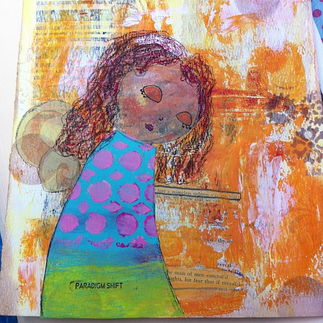 Image courtesy of Joyelle Brandt, flickr.com
Image courtesy of Joyelle Brandt, flickr.com In fact, women are at risk to develop postpartum depression during the first twelve months of their baby’s life.
Here are a few facts you need to know in oder to cope with those unwelcome baby blues:
1. Baby blues are common and to be expected - In fact, between 70 and 80% of women experience feelings of sadness, commonly known as the “maternity blues” in the first weeks after the birth of their child. According to the American College of Obstetricians and Gynecologists, for about 13% of women, however, the feelings of sadness continue longer than a few weeks, which may signal a more serious condition, called postpartum depression.
3. Feeling anxious, doubtful and overwhelmed does not make you a bad mother - No one expects you to be perfect and to know how to do everything. It is okay to feel insecure and nervous about doing things right. Allow others to help you and
4. Try to make time for yourself - adjusting to the fact that your own body doesn’t even belong to you anymore (if you are breast-feeding) and that there is a human being that needs you all the time is hard. It is very important that you try and take some time to yourself - get plenty of rest whenever you can and take advantage of people, willing to babysit for you while you take a shower or a nap.
5. Signs of postpartum depression - postpartum depression looks the same as “regular” depression, except that it occurs following the birth of a child. You may be experiencing postpartum depression if you are struggling with the following:
5.1. Feeling unusually sad, hopeless and withdrawn
5.2. Having no energy or motivation to do things
5.3. Sleeping too much or too little
5.4. Eating too much or too little
5.5. Crying a lot and losing interest in everyday activities
5.6. Apathy for your baby and lack of interest in caring for your baby
5.7. Irritability, anxiety or moodiness that interferes with you daily life
6. When you should to talk to a professional - If you are experiencing all of the aforementioned symptoms, it is likely that you are struggling with postpartum depression. If you cannot care for your child because of feeling extremely withdrawn, sad and hopeless, that’s a sign that you should consult with a professional. Also, if you are having consistent and recurrent thoughts about wanting to die, hurting yourself or your baby, that’s a red flag that the baby blues have gotten the worst of you and getting therapeutic help will be essential to your and your baby’s safety.
For more articles on common mental health issues, affecting you and your family, subscribe to Mental Health Digest and get the latest issue emailed to you today by leaving your name and email address in the contact form here.
Do you have questions? Found this article helpful? I would love to hear from you.



 RSS Feed
RSS Feed